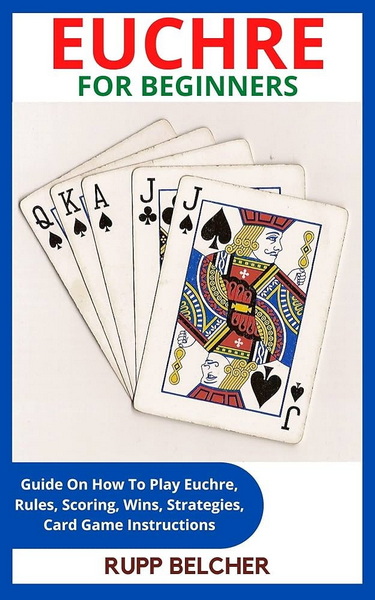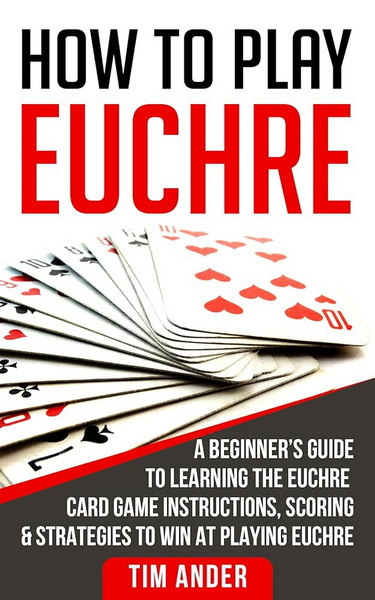Content Menu
● Origins and History
● Basic Gameplay
>> Players and Cards
>> Objective
>> Deal
>> Trump Selection (Bidding)
>> Going Alone
>> Playing a Trick
>> Card Ranking
>> Scoring
● Euchre Terminology
● Basic Strategies
>> Trump Selection
>> Playing Tricks
>> Advanced Strategies
● Variations of Euchre
● Euchre Etiquette
● Why Euchre Endures
● Conclusion
● Frequently Asked Questions
>> 1. What is the origin of the name "Euchre?"
>> 2. How many cards are used in a standard Euchre deck?
>> 3. What is the role of the Joker in some variations of Euchre?
>> 4. What does it mean to be "euchred" in Euchre?
>> 5. How does "going alone" affect the scoring in Euchre?
● Citations:
Euchre is a popular trick-taking card game, especially beloved in the Midwestern United States, Canada, and other parts of the English-speaking world[2][3][4]. Typically played with four players in two teams, Euchre combines simple rules with strategic depth, making it accessible to beginners while offering plenty of challenges for experienced card players[2]. This guide covers everything from the game's origins to advanced strategies, ensuring you're well-equipped to enjoy and excel at Euchre.

Origins and History
The history of can be traced back to the 19th century, with its roots in a German game called "Juckerspiel"[3][6][7]. The name "Euchre" itself is believed to be derived from this earlier game[3]. Euchre gained popularity in the United States during the mid-1800s and was even considered the national card game for a time[6]. The earliest documented rules appeared in 1844, in a book by Thomas Mathews[1]. Over time, Euchre spread to other countries, including Canada, the United Kingdom, New Zealand, and Australia, with regional variations evolving along the way[3][6].
Basic Gameplay
Players and Cards
Euchre is typically played with four players, divided into two teams of two, with partners sitting opposite each other[2][4][8]. A standard Euchre deck consists of 24 cards: the 9, 10, Jack, Queen, King, and Ace of each of the four suits (spades, hearts, diamonds, and clubs)[6]. Some variations include a Joker, known as the "best bower," which is the highest-ranking trump card[3][6].
Objective
The objective of Euchre is for a team to be the first to reach a predetermined score, usually 10 points[2][4][6]. Points are earned by winning tricks, especially when a team declares a trump suit and successfully takes at least three tricks[2].
Deal
The deal rotates clockwise among the players[1]. The dealer distributes five cards to each player, usually in a two-three or three-two sequence[1][3]. After the deal, the remaining cards form the kitty, and the top card of the kitty is turned face up to indicate a potential trump suit[1].
Trump Selection (Bidding)
The trump selection process, also known as bidding, is a crucial part of Euchre[2]. Starting with the player to the dealer's left (the "eldest hand"), each player has the option to "order up" the trump or "pass"[1][2].
- Ordering Up: If a player believes they and their partner can win at least three tricks with the suit of the turned-up card as trump, they can "order it up," compelling the dealer to accept that suit as trump[1][2]. The dealer then picks up the turned-up card and discards one card from their hand[1].
- Passing: If a player doesn't think they can win enough tricks with the turned-up suit as trump, they can "pass"[1][2]. The option then moves to the next player in clockwise order[1].
If all four players pass on the initial turn, a second round of bidding occurs[1]. In this round, players can choose any suit other than the suit of the turned-up card as trump[1]. If a player calls a trump in the second round, they are obligated to select a suit. If all players pass again, the hand is "thrown in," and the deal moves to the next player[1].
Going Alone
After a trump suit is declared, a player on the team that called trump has the option to "go alone"[1][2]. When a player goes alone, their partner's hand is laid face down, and the partner does not participate in the hand[1]. If the lone player wins at least three tricks, their team scores additional points. However, going alone is risky, as the player must win a majority of the tricks without their partner's help[1].
Playing a Trick
The player to the dealer's left leads the first trick by playing any card from their hand[2]. The other players, in clockwise order, must follow suit if they can[2]. If a player cannot follow suit, they may play any card, including a trump card[2]. The highest card of the led suit wins the trick, unless a trump card is played, in which case the highest trump card wins[2]. The winner of the trick leads the next trick[2].
Card Ranking
The ranking of cards in Euchre is unique, especially within the trump suit[1][6]. The highest-ranking card is the Jack of the trump suit, known as the "right bower"[1][6]. The second-highest card is the Jack of the same color as the trump suit, known as the "left bower"[1][6]. For example, if spades are trump, the Jack of spades is the right bower, and the Jack of clubs is the left bower[6]. The left bower is considered part of the trump suit[6].
The remaining trump cards rank in the standard order: Ace, King, Queen, 10, and 9[1][3]. Non-trump suits rank in the standard order: Ace, King, Queen, Jack, 10, and 9[3].
Scoring
Scoring in Euchre is relatively straightforward[1][2].
- If the team that called trump wins three or four tricks, they score 1 point[1][2].
- If the team that called trump wins all five tricks (a "march"), they score 2 points[1][2].
- If a player goes alone and wins three or four tricks, their team scores 1 point[1].
- If a player goes alone and wins all five tricks, their team scores 4 points[1][2].
- If the team that called trump fails to win at least three tricks (they are "euchred"), the opposing team scores 2 points[1][2].
The first team to reach 10 points wins the game[1][2].

Euchre Terminology
- Bower: The Jack of the trump suit (right bower) or the Jack of the same color as the trump suit (left bower)[3][6].
- March: Winning all five tricks in a hand[1][2].
- Euchred: Failing to win at least three tricks after calling trump, resulting in the opposing team scoring 2 points[1][2].
- Ordering Up: Accepting the turned-up card as the trump suit[1][2].
- Going Alone: A player attempting to win all five tricks without their partner's help[1][2].
- Trump: The suit that ranks higher than the others in a particular hand[1][2].
- Kitty: The remaining cards after the deal, with the top card turned up to indicate a potential trump suit[1].
Basic Strategies
Trump Selection
- Consider Your Hand: When deciding whether to order up the trump or call a new trump, evaluate the strength of your hand in the proposed suit[2]. High cards (Aces, Kings, Queens) and bowers are valuable[1][6].
- Assess Your Partner's Potential: Think about what cards your partner might have based on the cards you hold and the bidding so far[2].
- Weigh the Risks: Going alone can yield significant points but also carries the risk of being euchred[1][2].
Playing Tricks
- Follow Suit: Always follow suit when possible[2]. This helps you retain control and avoid trumping unnecessarily[2].
- Trump Wisely: Use trump cards strategically to win important tricks or protect against being euchred[2].
- Communicate with Your Partner: While verbal communication is not allowed, skillful play can signal information to your partner[2]. For example, discarding a particular card might indicate a shortage in that suit.
Advanced Strategies
- Counting Cards: Keep track of which cards have been played to make informed decisions about trumping and leading[3].
- Signaling: Use subtle plays to communicate information to your partner, such as leading a specific suit to indicate strength or weakness[2].
- Reading Opponents: Pay attention to the cards your opponents play and their bidding behavior to anticipate their strategies and potential holdings[2].
Variations of Euchre
Euchre has many variations, with different rules and scoring systems[2]. Some popular variations include:
- British Euchre: This variation typically includes a Joker, known as the "best bower," which is the highest-ranking trump card[6].
- Pepper: This variation has different scoring rules and gameplay nuances[2].
- Three-Handed Euchre: This variation involves three players, with one player playing alone against the other two[3].
- Five-Handed Euchre: This variation typically involves using a Joker and adjusting the scoring system[3].
Euchre Etiquette
- Be Respectful: Treat your opponents and partner with courtesy and respect[2].
- Avoid Slow Play: Make decisions in a timely manner to keep the game flowing smoothly[2].
- No Table Talk: Refrain from discussing your hand or strategy with your partner during the game[2].
- Shuffle and Deal Efficiently: Ensure that the cards are properly shuffled and dealt to maintain fairness[1].
- Be a Good Sport: Win or lose, maintain a positive attitude and congratulate the winning team[2].
Why Euchre Endures
Euchre's enduring appeal lies in its blend of simplicity and strategy[2]. The basic rules are easy to learn, making it accessible to players of all ages and skill levels[2]. However, mastering Euchre requires a deep understanding of card play, trump selection, and partnership dynamics[2]. The game's inherent unpredictability and potential for strategic maneuvering keep players engaged and coming back for more[2]. Euchre fosters social interaction, as it is typically played in a relaxed and convivial setting[2]. Whether played casually with friends and family or in more competitive tournaments, Euchre provides a fun and rewarding experience for all who participate[2].
Conclusion
Euchre is more than just a card game; it is a social tradition that has been enjoyed for generations[2][6]. Its combination of straightforward rules and strategic complexity makes it a timeless classic[2]. Whether you are a seasoned player or a curious newcomer, Euchre offers a wealth of opportunities for fun, challenge, and camaraderie[2]. So gather your friends, shuffle the deck, and dive into the engaging world of Euchre.

Frequently Asked Questions
1. What is the origin of the name "Euchre?"
The name "Euchre" is believed to be derived from the 19th-century Alsatian game called "Juckerspiel"[3]. The term "Jucker" referred to the jack, which is a prominent card in the game[3].
2. How many cards are used in a standard Euchre deck?
A standard Euchre deck consists of 24 cards: the 9, 10, Jack, Queen, King, and Ace of each of the four suits (spades, hearts, diamonds, and clubs)[6].
3. What is the role of the Joker in some variations of Euchre?
In some variations, particularly British Euchre, a Joker is added to the deck[6]. The Joker is known as the "best bower" and is the highest-ranking trump card[6].
4. What does it mean to be "euchred" in Euchre?
To be "euchred" means that the team that called trump fails to win at least three tricks[1][2]. When this happens, the opposing team scores 2 points[1][2].
5. How does "going alone" affect the scoring in Euchre?
If a player goes alone and wins three or four tricks, their team scores 1 point[1]. If a player goes alone and wins all five tricks (a march), their team scores 4 points[1][2].
Citations:
[1] https://en.wikipedia.org/wiki/Euchre
[2] https://www.officialgamerules.org/card-games/euchre
[3] https://www.britannica.com/topic/euchre
[4] https://eu.usatoday.com/story/graphics/2023/08/16/how-to-play-euchre-card-game/70473074007/
[5] https://www.parlettgames.uk/histocs/euchre.html
[6] https://euchre.com/rules/
[7] https://euchre.com/blog/euchre-origin-the-rich-history-of-euchre/
[8] https://gamerules.com/rules/euchre-rules/
































